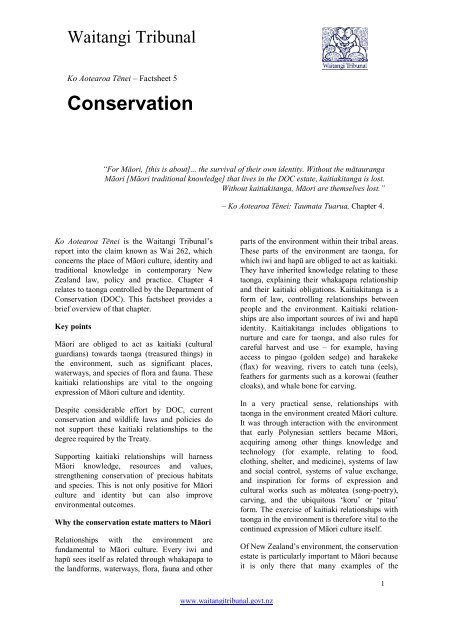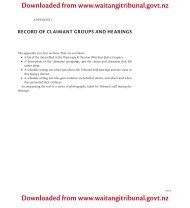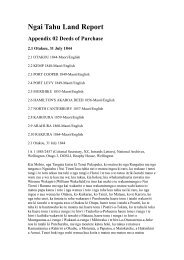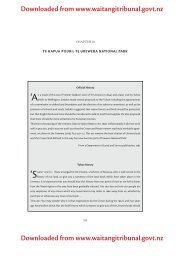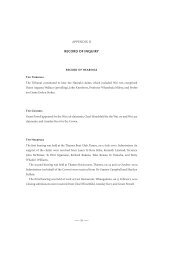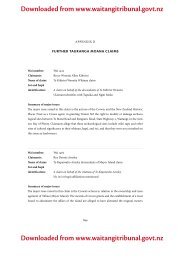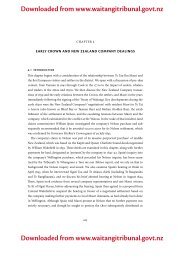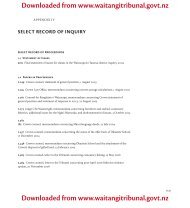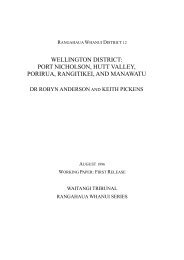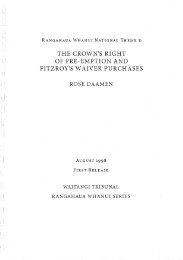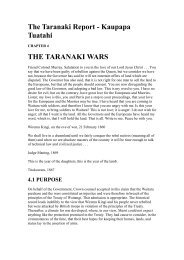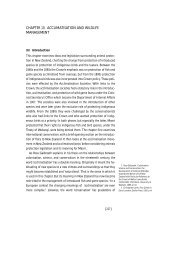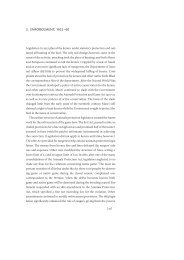Ko Aotearoa Tēnei Factsheet 5: Conservation - Waitangi Tribunal
Ko Aotearoa Tēnei Factsheet 5: Conservation - Waitangi Tribunal
Ko Aotearoa Tēnei Factsheet 5: Conservation - Waitangi Tribunal
You also want an ePaper? Increase the reach of your titles
YUMPU automatically turns print PDFs into web optimized ePapers that Google loves.
<strong>Waitangi</strong> <strong>Tribunal</strong><br />
<strong>Ko</strong> <strong>Aotearoa</strong> <strong>Tēnei</strong> – <strong>Factsheet</strong> 5<br />
<strong>Conservation</strong><br />
“For Māori, [this is about]... the survival of their own identity. Without the mātauranga<br />
Māori [Māori traditional knowledge] that lives in the DOC estate, kaitiakitanga is lost.<br />
Without kaitiakitanga, Māori are themselves lost.”<br />
<strong>Ko</strong> <strong>Aotearoa</strong> <strong>Tēnei</strong> is the <strong>Waitangi</strong> <strong>Tribunal</strong>’s<br />
report into the claim known as Wai 262, which<br />
concerns the place of Māori culture, identity and<br />
traditional knowledge in contemporary New<br />
Zealand law, policy and practice. Chapter 4<br />
relates to taonga controlled by the Department of<br />
<strong>Conservation</strong> (DOC). This factsheet provides a<br />
brief overview of that chapter.<br />
Key points<br />
Māori are obliged to act as kaitiaki (cultural<br />
guardians) towards taonga (treasured things) in<br />
the environment, such as significant places,<br />
waterways, and species of flora and fauna. These<br />
kaitiaki relationships are vital to the ongoing<br />
expression of Māori culture and identity.<br />
Despite considerable effort by DOC, current<br />
conservation and wildlife laws and policies do<br />
not support these kaitiaki relationships to the<br />
degree required by the Treaty.<br />
Supporting kaitiaki relationships will harness<br />
Māori knowledge, resources and values,<br />
strengthening conservation of precious habitats<br />
and species. This is not only positive for Māori<br />
culture and identity but can also improve<br />
environmental outcomes.<br />
Why the conservation estate matters to Māori<br />
Relationships with the environment are<br />
fundamental to Māori culture. Every iwi and<br />
hapū sees itself as related through whakapapa to<br />
the landforms, waterways, flora, fauna and other<br />
– <strong>Ko</strong> <strong>Aotearoa</strong> <strong>Tēnei</strong>: Taumata Tuarua, Chapter 4.<br />
www.waitangitribunal.govt.nz<br />
parts of the environment within their tribal areas.<br />
These parts of the environment are taonga, for<br />
which iwi and hapū are obliged to act as kaitiaki.<br />
They have inherited knowledge relating to these<br />
taonga, explaining their whakapapa relationship<br />
and their kaitiaki obligations. Kaitiakitanga is a<br />
form of law, controlling relationships between<br />
people and the environment. Kaitiaki relationships<br />
are also important sources of iwi and hapū<br />
identity. Kaitiakitanga includes obligations to<br />
nurture and care for taonga, and also rules for<br />
careful harvest and use – for example, having<br />
access to pingao (golden sedge) and harakeke<br />
(flax) for weaving, rivers to catch tuna (eels),<br />
feathers for garments such as a korowai (feather<br />
cloaks), and whale bone for carving.<br />
In a very practical sense, relationships with<br />
taonga in the environment created Māori culture.<br />
It was through interaction with the environment<br />
that early Polynesian settlers became Māori,<br />
acquiring among other things knowledge and<br />
technology (for example, relating to food,<br />
clothing, shelter, and medicine), systems of law<br />
and social control, systems of value exchange,<br />
and inspiration for forms of expression and<br />
cultural works such as mōteatea (song-poetry),<br />
carving, and the ubiquitous ‘koru’ or ‘pitau’<br />
form. The exercise of kaitiaki relationships with<br />
taonga in the environment is therefore vital to the<br />
continued expression of Māori culture itself.<br />
Of New Zealand’s environment, the conservation<br />
estate is particularly important to Māori because<br />
it is only there that many examples of the<br />
1
original <strong>Aotearoa</strong> environment survive, so only<br />
there can iwi and hapū exercise their kaitiaki<br />
obligations. The importance of the conservation<br />
estate to Māori is recognised in the <strong>Conservation</strong><br />
Act, which requires DOC to interpret all of its<br />
conservation responsibilities in such a way as to<br />
‘give effect to the principles of the Treaty of<br />
<strong>Waitangi</strong>’. This is one of the strongest Treaty<br />
provisions on New Zealand’s statute books.<br />
What the Treaty requires<br />
The Treaty gives the Crown the right to govern,<br />
but in return requires the Crown to protect the<br />
tino rangatiratanga (full authority) of iwi and<br />
hapū in relation to their ‘taonga katoa’ (all that<br />
they treasure). The courts have characterised this<br />
exchange of rights and obligations as a<br />
partnership.<br />
In this context, the Treaty allows the Crown to<br />
put in place laws and policies for conservation of<br />
the environment and wildlife. But in doing so the<br />
Crown must to the greatest extent practicable<br />
protect the authority of iwi and hapū in relation<br />
to taonga such as land, waterways, natural<br />
features, and flora and fauna, so that they can<br />
fulfil their obligations as kaitiaki.<br />
What the <strong>Tribunal</strong> has found<br />
The parts of the environment under DOC control<br />
are so important to Māori culture that partnership<br />
should be the standard approach. This<br />
partnership should seek to bring together Māori<br />
cultural values and the ‘preservationist’ approach<br />
to conservation, creating a new approach which<br />
the <strong>Tribunal</strong> has called ‘kaitiaki conservation’.<br />
This partnership should be based on two<br />
principles: first and foremost, that the survival<br />
and recovery of the environment is paramount;<br />
and, secondly, that iwi have a right to exercise<br />
kaitiakitanga and maintain their culture.<br />
This partnership has potential to harness Māori<br />
knowledge, resources, and values and so<br />
strengthen conservation of precious habitats and<br />
species. This will not only strengthen Māori<br />
culture and identity but also improve<br />
environmental outcomes for places and species<br />
that are of national importance.<br />
In spite of considerable effort by DOC and<br />
tangata whenua, current approaches fall short of<br />
www.waitangitribunal.govt.nz<br />
this partnership standard. Instead, in general,<br />
laws and policies reserve ownership and control<br />
over the environment and protected wildlife for<br />
the Crown. This leaves iwi and hapū unable to<br />
exercise their kaitiaki obligations, and so<br />
deprives them of a core aspect of their culture.<br />
To remedy this, the <strong>Tribunal</strong> has recommended<br />
the establishment of new national and regional<br />
partnership structures to give Māori an equal<br />
voice with the New Zealand <strong>Conservation</strong><br />
Authority and regional conservation boards in<br />
setting conservation objectives and priorities.<br />
Within this overall partnership framework,<br />
decisions should be made case by case about the<br />
management of individual taonga, by fairly and<br />
transparently balancing kaitiaki interests<br />
alongside other interests.<br />
Decision-making about customary use of taonga<br />
(that is, the harvesting and use of plants or<br />
resources from wildlife for traditional uses such<br />
as weaving, carving, and ceremonial uses)<br />
should also be shared, but at a local level<br />
between tangata whenua and DOC<br />
conservancies. Again, decisions should be based<br />
on the principles that the survival of the species<br />
is paramount, but that iwi have a right to exercise<br />
kaitiakitanga and maintain their culture.<br />
The <strong>Tribunal</strong> has also recommended amendments<br />
to the Wildlife Act to provide that<br />
management of protected wildlife be shared<br />
between the Crown and Māori, and that no one<br />
‘owns’ protected wildlife (currently, the Crown<br />
owns protected wildlife).<br />
The <strong>Tribunal</strong> found that DOC should develop<br />
policies for consultation with tangata whenua<br />
when the department is awarding concessions<br />
and commercial contracts in the conservation<br />
estate. It also found that tangata whenua<br />
interests in taonga are entitled to a reasonable<br />
degree of preference when DOC awards those<br />
concessions and contracts. This would allow<br />
kaitiaki relationships to be strengthened through<br />
work (for example, pest control, research, and<br />
heritage preservation) or business opportunities<br />
(for example, historical or botanical tours).<br />
See <strong>Ko</strong> <strong>Aotearoa</strong> <strong>Tēnei</strong> chapter 4 for full<br />
details of the <strong>Tribunal</strong>’s findings and<br />
recommendations.<br />
2


